A constant tickle in throat with dry cough can be very irritating and at times discomforting. What then do you need to do to get rid of it? Before we answer that question, we first need to know what the underlying cause of the tickle is. In this topic, we shall discuss the possible causes of the tickle including cancer. We shall also suggest possible treatment option and home remedies to help ease the irritation back at home.
According to Alyn Morice, a professor of respiratory medicine at the University of Hull, coughs are mainly a protective reflex to remove foreign bodies, mucus or irritants out of the respiratory track. A tickly cough is produced when you cough but do not produce mucus. The cough can also be said to be non-productive cough. It is the lack of mucus when coughing that causes the through to fell irritated. This can be aid to be dry cough. The other possible causes will include allergy, cold or an oral infection.
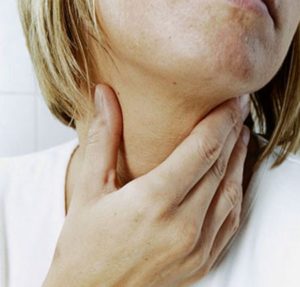
If you have a persistent irritating cough, you need to see immediate medical attention as this could indicate a serious underlying medical condition such as oral cancer, pneumonia or bronchitis. If left unchecked, they could be a health risk.
Tickle in Throat Causes
As started earlier, a tickle in throat can be very irritating and discomforting. The severity of the irritation will depend on the underlying cause of the coughing. For medication and treatment, your doctor will have to first diagnose the cause. Below are some of the possible cause of an irritating tickly cough.
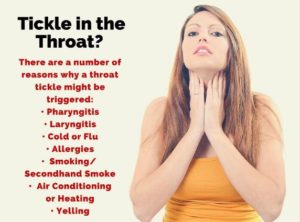
Tickle in Throat Cancer
Without running to conclusion, throat and lung cancer can be the cause for the tickle in throat and the persistent coughing. You need to have a professional heath care provider diagnose the condition to be sure the cause is cancer before treatment can commence. Treatment will include surgery, chemotherapy or radiation therapy.
Tickle in Throat after Cold
Cold, pollution and smoky environments are the common known triggers of cough which can be accompanied by tickling and irritation of the throat. As you breath, small dusty particle in the air you breathe will get trapped in the mucous lining causing irritation and the need to cough.
Avoiding dusty environment or cold can help prevent the tickling and coughing.
Acid reflux causing tickly cough
When the acid reflux gets past the upper esophageal sphincter, it ca enter the throat or the voice box causing sore throat. This can cause chronic dry cough especially at night or after meals. Acid reflux can be worsen by foods and drinks like chocolate, citrus fruits, garlic and spicy foods.
Allergy causing tickly throat
Allergic rhinitis may develop within minutes of breathing in an allergen. The symptoms that develop can last for days and will include the following:
- Sneezing,
- Running nose
- Tickle in throat
- Itchy and watery eyes
- Stuffy nose
Pneumonia and tickle in throat
Pneumonia is a lung infection caused by bacterial or viral infection. It is a condition in which the air sacs fill with pus and may become solid. The inflammation can affect both lung, a single lung or only certain lobes.
Mild cases of pneumonia can be treated at home with rest, antibiotics or by drinking plenty of fluids. For more severe cases, you need to seek immediate medical attention.
Bronchitis
Bronchitis is the other possible cause of tickling and coughing. It is the inflammation of the mucous membrane in the bronchial tubes. Bronchitis is known to cause bronchospasm and coughing. Acute bronchitis can be treated at home without professional help but for severe case, yo need to seek immediate medical attention.
Asthma causing tickly cough
Asthma is a respiratory condition marked by spasms in the bronchi of the lungs, causing difficulties in breathing. Asthma is caused by allergic reaction or other form of hypersensitivity.
Dry cough after surgery
It is also possible to experience a dry cough after surgery which might cause the irritation and tickling in the throat after a throat surgery. This will clear up on its own as the wound recovers.
Smoking causing tickle in throat
Smoking is the most common cause of tickly and dry cough. Cigarette smoke, dust atmosphere and pollution are common triggers of a tickly cough. Avoiding these triggers will help prevent and reduce the irritation.
Tickle in Throat and Chest
Tickle in throat and chest can be described as a strange sensation and lower throat. It is a heavy feeling with no pain and tickling cough sensation in the chest. The sensation will then move upwards to the lower throat area and make it feel as though it is becoming tight.
If the tickle and the coughing persist for more than 8 weeks, then this could be caused by a virus or an underlying infection, we advise you seek immediate medical attention. Your health care provider will perform an X-ray to rule out any serious underlying disease. The same should be done if you start experience symptoms such as coughing up blood.
Tickle in Throat Causing Constant Cough
The most common cause of tickle in throat causing coughing will include the following:
1. Tuberculosis
Tuberculosis is an infectious bacterial disease characterized by growth of nodules especially in lungs. TB is it is commonly referred to spreads from inhaling tiny droplets from the cough or sneezes of an infected person. It is a serious condition but can be cured when treated with the right antibiotics.
Symptoms will include: persistent coughing, weight loss, night sweat, fever and swelling in the neck. When infected with TTB you need to avoid public places such as school, work place or places with lots of people.
2. Whooping cough
Whooping is the other contagious bacterial disease chiefly affecting children. The condition is characterized by a convulsive cough followed by a whooping cough. It causes repeated coughing bouts that can last for two to three months.
Seek medical attention if you notice the following symptoms:
- Coughing bout that last for more than 5 minutes
- Coughing that brings up thick mucus followed by vomiting
- Trouble breathing
- Strain of coughing that causes the face to become red
3. Lung cancer
A persistent cough that lingers can be a symptoms of lung cancer. It is common for a cough associated with cold or respiratory infection to go away within a week or two. Do not be tempted to ignore a stubborn cough whether it is dry or produces mucus. See your health care provider as soon as possible.
4. Sinusitis
Sinusitis is the inflammation of the nasal sinus. Sinus are cavity within a bone or tissue connecting with the nasal cavities. The inflammation is primarily caused by an infection. Sinusitis can either be acute or chronic. Chronic sinusitis is rare.
5. Acidic reflux
Acidic reflux is a common symptom of burning pain felt internally around the lower chest area. It is caused by stomach acid flowing back up into the food pipe.
Tickle in Throat Dry Cough at Night
A chronic dry cough can be said to be the main cause of the tickle in throat both at day and at night. A stubborn dry cough that comes and goes but never disappears is what we are referring to as a chronic dry cough. The dry cough usually prompts a coughing fit that last around 10 minutes. In extreme cases, those who suffer from chronic dry cough will experience incontinence and even fractured ribs.
The cause of chronic dry cough used to be written off as unexplained, but with time, doctors have discovered that in some cases, the problem is hypersensitivity in upper air waves and is triggered by a reflux of gas from the stomach. Professor Morice explains that, this gas is a mist, containing air, bits of blood and stomach enzymes that irritates the upper area of the throats.
Tickly throat caused by dry cough can be relieved by antihistamine and small doses of morphine. This medication need to be prescribed by a specialist. Sucking a strong menthol-lozenge can help with immediate relief.
Dry cough at night can also be caused by chronic tickly cough. Although this kind of cough does not produce phlegm, you will feel as is mucus is dripping down the back of your throat. Some people also feel as if there is a lump in the throat.
According to Professor Peter Barnes, head of respiratory medicine at Imperial College London, this is known as post-nasal drip, it is responsible for around 7 percent of coughs. For a normal human, we produce around four pins of clear thin mucus every day from the gland that lines the nose and sinuses. This usually drops unnoticed down your throat.
During an allergy or an infection, or when the mucus is in excess, it triggers a coughing reflex as it drips down the throat. This condition can be treated by using products such as Otrivin or non-steroid which give relief by reducing the swelling in the nose and the post-nasal drip.
Tickle in Throat Post Nasal Drip
Post nasal drip occur when there is thick or excessive amount of mucus that tend to drip in the back of throat causing irritation and slight discomfort. Post nasal drip are not panful, but the sore throats that form as a result of the drip might be painful.
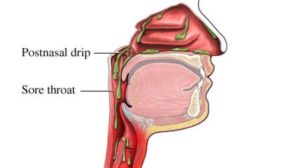
The sore throats are caused as a result of post nasal drip tickling in the throat. Constant trying to clear the mucus can also cause sore throats. For most people, the most common symptoms of post nasal drip will include the following:
- Coughing
- Snorting
- Constant clearing of the throat
- Difficulty breathing
- Sore throats
- Stomach upset
- Sneezing
- Bad breath
The risk of having sore throat due to post nasal dripping increases when you leave the condition untreated.
Post nasal drip is caused by either an illness such as a cold or flu along with nasal allergies. Because of constant snorting, coughing and clearing, it is common for people with post nasal dripping to have sore throats. Those who live in dry are, have certain food allergies or smoke are at the highest risk of developing post nasal drip. Pregnancy and contraceptive pills can also be said to cause this condition.
To prevent post nasal dripping, you need to avoid dairy product like milk which tend to attract more mucus. Spicy foods can also flare up post nasal drip. Drink plenty of water to remain hydrated. To prevent the mucus from getting worse, fruit juice can be of help.
Tickle in Throat Causing Cough and Vomiting
A constant tickle in throat causing coughing and vomiting can be perplexing. This is because, if you are not sick, then what could be causing the condition. For those who do not smoke or are generally healthy what could be causing the tickle? On the contrary, if you smoke or have an underlying medical condition, then that could be the answer we are looking for. Quite smoking and seek medical attention for any underlying infection.
Before we jump to conclusion and say that throat cancer is the cause of the tickly throat, we need to first be able to observe other symptoms. Chances are that, the tickly could be caused by asthma, hay fever or cold or weak lungs or simply a mild environmental irritation.
A tickle in the throat can feel itchy and there is often, unproductive cough that comes and goes. As said, unproductive cough is one that does not have mucus. At times, the cough will directly be associated with the tickle, whereas other time the cough will simply be a byproduct of the tickling. The cough thus becomes an automatic response to an irritation. Some common symptoms associated with the tickle will include the following:
- Itchy back of throat
- Dry unproductive cough
- A constant ticklee in throat when you are lying down
- The inside of ear feels itchy.
Tickle in throat can be caused by the following:
- Sore throats also referred to as pharyngitis. It is the inflammation of the pharynx casing irritation, cough and a tickle. The cause of the condition is bacterial and viral infection
- Cold or flu, produces upper respiratory symptoms such as coughing, sore throats and post nasal drip. All of the aforementioned causes tickly throat
- Laryngitis or inflammation of the larynx or the voice box. This is caused by cold, upper respiratory infection, smoking, air pollution or simply shouting and making a lot of noise.
- Primary and secondary smoking can also cause tickly throat or irritation.
- Air conditioning creates dry air which can take a toll on our bodies. The dry air can cause dry nasal passage and throats. This will in turn trigger tickling which causes coughing.
- Yelling, screaming and excessive talking can also cause the tickling and coughing
Tickle in throat treatment
A tickly throat does not pose any health risk. It is in most cases mild and will clear on its own within a week or two. For severe cases, you need to seek immediate medical attention to have the underlying cause of the tickling established. Your health care provider will prescribe any or a combination of the following to get rid of the tickling:
- Antihistamine medication where the underlying cause if the tickling is allergy or allergic reaction to food or medicines.
- Non-steroid medication can also be used in cases of severe tickling and vomiting
- For bacterial or viral infection causing the tickling an coughing, oral antibiotics will be prescribed
- Anti-allergy or allergic medication will be used in cases of severe allergies
- For those who use air conditioners, you will be required to use a humidifier.
How to get rid of tickle in throat –Home remedies
Apart from the prescriptions above, tickle in throat can be relieve at home using simple natural home remedies. Take NOTE that the remedies will respond differently from one person to another. They do not necessarily heal an underlying medical infection causing the tickling but help relieve the symptoms associated with the tickling in throat.
How to Get Rid of a Tickle in Throat – Video
https://www.youtube.com/watch?v=dyCVr4jma3o
That is to say, the remedies can be very effective for mild cases of the tickling, for severe cases, you need to seek immediate medical attention to establish the underlying cause of the infection. Seek medical attention if the remedies fail to help relieve the itching, irritation and tickling in throat.
You can try the following home remedies:
a) Warm salty water gargle
Sea salt is organic with a lot of therapeutic properties. Gargling with warm salty water will help soothe the throat and relieve the dryness causing the coughing and itching in the throat. For inflamed larynx caused by bacterial infection, salty water gargle can also be of great help.
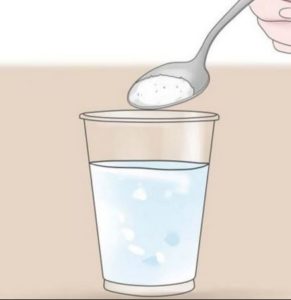
Salt is a natural antibacterial and antiseptic which help soothe the inflammation thus curbing the itching and tickling.
Mix a table spoon of salt in a glass of warm water and gargle twice in a day. Repeat this for a week for optimal result.
b) Apple cider vinegar
When used in warm water, apple cider vinegar is able to get rid of mild throat infection. it is a good remedy for sore throat, cold and flu. Cider vinegar is known to relive dry cough and in turn reduce the tickling in throat and chest. To prepare the remedy,
Add a tea spoon of raw apple cider vinegar in a glass of warm clean water. To make an even more effective remedy, you can add a tea spoon of organic honey in the mixture. Gargle the mixture for around 20 minutes twice a day. Repeat the procedure for a week or two for optimal result.
c) A mixture of honey and lemon tea
To get the tickle going fast, a cup of lemon juice and honey can come in handy. Just extract a cup full of lemon juice, add a table spoon or two of raw organic honey and gently mix the contents. Sip the mixture slowly to relive the itching and tickling in throat. Do this daily for a week or two. If the symptoms persist, seek medical attention.
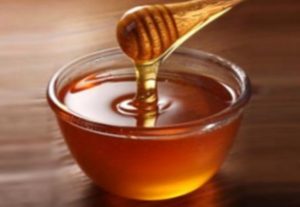
d) Plenty of clean water
Another easy way to relieve the tickling is rehydrating the throat by drinking plenty of clean water. Water help keep the throat moist and prevent dryness which is known to cause coughing an itching. This is an effective remedy for cough caused by nasal irritation, smoking, allergies or simply just a throat tickle.
e) Aloe Vera juice
For inflammation around throat causing the tickling and cough, aloe Vera is the best remedy to help you relieve that. According to research, aloe Vera is a natural antibacterial, antiseptic and anti-inflammatory agent.
Squeeze a fresh aloe Vera plant to get the gel. You can add raw honey for children and the result will be twice as good.
f) Avoid sugary drinks like juice and soda
Avoid sugary drinks like pineapple juice or drinking tea with a lot of sugar can also help relive the coughing and tickle in throat.
g) Raw ginger tea
Raw ginger can also help relieve the coughing and tickling in throat. To prepare the remedy, boil a fresh ginger in a pot for 30 minute. Then cool the soup and drink twice I a day for a week. This is an effective remedy to soothe and cure dry cough especially at night.
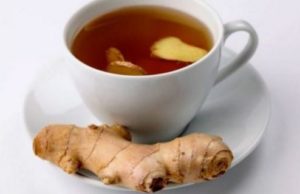
h) Avoid dusty environments
Finally you need to make sure you stay in a clean environment free of dust and other allergen that might trigger post nasal drip or coughing. Keep your beddings clean and avoid dust. If you have to be in this kind of environment, make sure you are wearing a face mask or protective gear.
Sources and references
- Tickle in Throat: http://www.healthyhowto.org/throat/throat-tickle/tickle-in-throat-causes-constant-cough-dry-at-night-get-rid-stop-persistent-tickle/
- Post nasal drip: http://www.therabreath.com/post-nasal-drip-sore-throat.html
- Coughing, sore throats or vomiting: http://symptomchecker.webmd.com/multiple-symptoms?symptoms=cough%7Cgagging%7Cnausea-or-vomiting%7Csore-throat&symptomids=59%7C590%7C156%7C219&locations=10%7C10%7C20%7C10
- Constant tickle in throat: http://www.doctorshealthpress.com/general-health-articles/constant-tickle-in-throat
- Whooping cough and tickle throat: http://www.nhs.uk/conditions/Whooping-cough/Pages/Introduction.aspx
